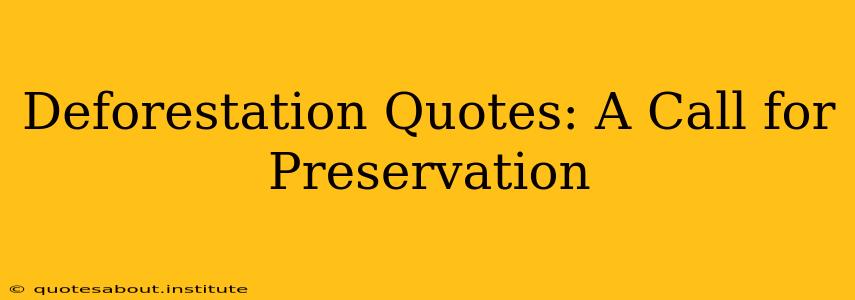Deforestation, the clearing of forests for other land uses, is a devastating global issue with far-reaching consequences. From climate change to biodiversity loss, the impact is profound and demands urgent action. This article explores the gravity of deforestation through poignant quotes from prominent figures, highlighting the urgent need for preservation and sustainable practices. We'll also delve into some frequently asked questions surrounding this critical environmental concern.
The Dire Reality of Deforestation: Powerful Quotes
Many influential voices have spoken out against deforestation, expressing the urgency of the situation and the need for immediate action. Here are some impactful quotes that capture the essence of this environmental crisis:
-
"The best time to plant a tree was 20 years ago. The second best time is today." – Chinese Proverb: This proverb speaks to the importance of proactive action, even if we've missed opportunities in the past. Every effort, no matter how small, contributes to a healthier planet.
-
"Forests are the lungs of our land, purifying the air and giving fresh strength to our people." – Franklin D. Roosevelt: This quote beautifully illustrates the vital role forests play in maintaining clean air and overall human health. Their destruction directly impacts our well-being.
-
"The Earth provides enough to satisfy every man's needs but not every man's greed." – Mahatma Gandhi: This powerful quote highlights the root cause of much deforestation—unsustainable consumption driven by greed, rather than necessity.
-
"When we heal the Earth, we heal ourselves." – Unknown: This quote emphasizes the interconnectedness between the health of our planet and the health of humanity. Protecting forests is crucial for our collective well-being.
Frequently Asked Questions about Deforestation
Here are some commonly asked questions about deforestation, answered in detail:
What are the main causes of deforestation?
The primary drivers of deforestation are multifaceted and interconnected. Agriculture (particularly large-scale farming and cattle ranching) is a major contributor, as forests are cleared to create land for crops and livestock grazing. Logging for timber and wood products is another significant factor, often leading to unsustainable exploitation of forest resources. Mining operations also cause extensive deforestation as land is cleared for resource extraction. Infrastructure development, including road construction and urbanization, contributes significantly to forest loss as well. Finally, population growth and increasing demands for resources exacerbate these pressures.
What are the environmental consequences of deforestation?
The environmental consequences of deforestation are severe and far-reaching. Climate change is significantly impacted due to the loss of carbon sinks (forests absorb and store vast amounts of CO2). This leads to increased greenhouse gas emissions and accelerates global warming. Biodiversity loss is another devastating consequence, as deforestation destroys habitats and leads to the extinction of countless plant and animal species. Soil erosion increases significantly as trees no longer stabilize the soil, leading to land degradation and reduced agricultural productivity. Water cycle disruption occurs as forests play a critical role in regulating rainfall and maintaining water quality. Deforestation can lead to altered precipitation patterns and water scarcity.
What can be done to stop deforestation?
Addressing deforestation requires a multi-pronged approach involving global cooperation and individual action. Sustainable forestry practices are crucial, emphasizing responsible logging and reforestation efforts. Promoting sustainable agriculture and reducing our reliance on unsustainable farming methods is essential. Supporting policies that protect forests and penalize illegal logging is vital. Investing in renewable energy can reduce our dependence on fossil fuels and lessen the pressure to clear forests for energy production. Finally, raising awareness about the importance of forest conservation and promoting responsible consumption are key to fostering lasting change.
How does deforestation affect human health?
Deforestation has serious implications for human health. The loss of forests contributes to air pollution, leading to respiratory problems and other health issues. The disruption of ecosystems can increase the risk of zoonotic diseases, as humans come into closer contact with wildlife. The loss of biodiversity can reduce access to medicinal plants and other natural resources vital for healthcare. Furthermore, deforestation can lead to food insecurity and water scarcity, indirectly impacting public health.
What are some examples of successful deforestation prevention efforts?
Successful initiatives often involve community-based approaches, combining local knowledge with scientific expertise. Community forestry programs empower local communities to manage and protect their forests sustainably. Protected areas and national parks play a crucial role in safeguarding biodiversity and preventing deforestation. Reforestation and afforestation projects are essential for restoring degraded forests and expanding forest cover. Innovative approaches, such as using technology to monitor deforestation and combat illegal logging, are also proving effective. Examples of such successful projects can be found in various parts of the world, showcasing the power of community involvement and effective policy implementation.
Conclusion: A Collective Responsibility
The quotes highlighted above serve as a powerful reminder of the critical importance of forest conservation. Deforestation is not merely an environmental issue; it's a societal, economic, and health crisis that demands immediate and concerted global action. By understanding the causes and consequences of deforestation, and by actively engaging in solutions, we can work towards a future where forests thrive and contribute to a healthier planet for generations to come. The time to act is now.

